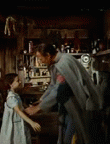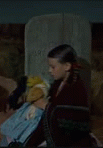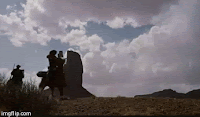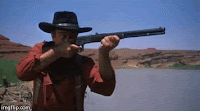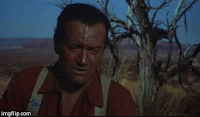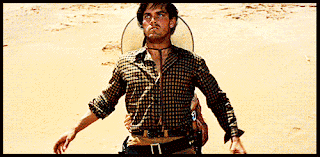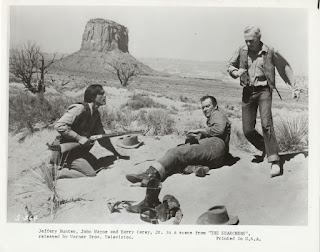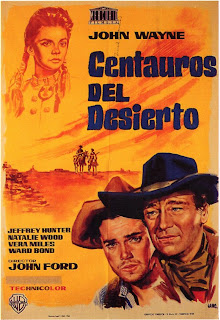ooooooooooooooooooooooooooooooooooooooooooooooooooooooooooooooooooooooooooo
CRITICA EN EN PERIODICO "LA VANGUARDIA" (18-6-1961)
oooooooooooooooooooooooooooooooooooooooooooooooooooooooooooooooooooooooooo
"We Be Texicans"
If John Wayne was ever cornered about what his favorite movie role was he'd be answering Ethan Edwards in The Searchers. Proof of that is obvious, he named his son by his third marriage John Ethan Wayne.
Ethan Edwards takes his time in returning home to Texas from the Civil War to the home of his brother and his family. But soon after he does the family is massacred in an Indian raid. The two young daughters are taken prisoner and Wayne with Jeffrey Hunter and Harry Carey, Jr. go off in search of them. Carey is killed early on, but Wayne and Hunter go on for years, both driven men for different reasons.
Ethan Edwards is probably the most racist man Wayne ever portrayed on the screen, yet we feel sympathy for him at the same time. It's been a hard and bitter life on the frontier for him. Just as it's been for the Indians as well. Chief Scar, played by Henry Brandon, is Wayne's opposite number and he makes clear what he thinks of whites. Two of his sons were killed and he's going to take many white scalps in reprisal.
My guess is that Ethan Edwards war service involved him seeing the war of desolation waged by William T. Sherman in the deep South. Small wonder he goes out and starts killing buffalo with a maniacal intensity that Wayne never showed before or since in film. Not an aspect that is normally brought out by reviewers.
Wayne's relationship with Jeffrey Hunter is a strange one. He found Hunter as a toddler during a raid on a wagon train. Hunter is a distant cousin of the Edwards family and one eighth Cherokee. But to Wayne he's an Indian. He gains a grudging respect for him on the trail though.
But Hunter's there to stop him. The oldest Edwards daughter is discovered dead early on. That by the way is an intense scene where Wayne's facial expressions register more than pages of dialog. Wayne had one of the great faces for close-ups and John Ford well knew it.
The younger daughter has grown up and is played grown up by Natalie Wood. Wayne feels he has to avenge some family code of honor because Wood's been taken as a bride by Henry Brandon. Hunter just wants his cousin back on any terms.
John Ford as he always does, gets some good comedy relief of the broad kind in the film. Jeffrey Hunter and Vera Miles who is Harry Carey's sister have a thing going, but when she doesn't hear from him she almost ups and marries Ken Curtis. Hunter and Curtis's confrontation is pretty funny.
Ford also probably made his best use of Monument Valley in this film. Though Stagecoach and Fort Apache are also among his best photographed films, The Searchers being in color is in a class by itself. Proof of that is the scene at the Edwards home at twilight just before the Indian raid. Beautiful and terrifying at the same time.
Ward Bond has a great role as Reverend/Captain Samuel Clayton, parson and Texas Ranger at the same time. A difficult job for some to reconcile, but I'm sure Bond believes that conversion of the Indians is not uppermost on his mind. Bond also has some great blustering comic moments with Patrick Wayne who plays an earnest young army lieutenant.
The Searchers is usually found on just about every top ten list of best westerns ever made and it surely belongs there.
oooooooooooooooooooooooooooooooooooooooooooooooooooooooooooooooooooooooooooooooooo
New Discoveries
About ten minutes into the film, there is a shot which begins with Captain Clayton (Ward Bond) slamming a door behind two children who were teasing two young lovers, Lucy and Brad. There follows a wordless interior shot, lasting maybe a minute, wherein Aunt Martha takes out Ethan's Confederate overcoat, tenderly caressing it before she hands it to Ethan. I noticed the sequence when I recently watched the film again, and I had to rewind and play it once more because I found it so stunning--all of the information and emotions conveyed without a word. I'd watched the film previously maybe a dozen times and had never noticed the power of this sequence.
Don't for a second tell me that Ethan is a stereotype, because there is so much more at work here. Obviously we are not supposed to sympathize with Ethan's prejudices, but notice that Ethan is not the only one who feels that way. Laurie (not at all disapprovingly) tells Martin that Aunt Martha would have preferred her daughter to be killed after being defiled. Interestingly, Martin is one-eighth Cherokee, which under the old racial percentages of the Confederacy would make him the equivalent of an octoroon, and therefore non-white. Martin's intended marriage to Laurie, on racial terms, would have been as taboo as Debbie marrying Scar: Laurie believes that death is preferable for Debbie, but she intends to do likewise with Martin. The contrast is that Debbie was abducted, whereas Laurie would willingly go. And note at the end that Laurie walks right by Debbie, as she heads for Martin.
The final shot is famous, but I noted the doorway theme throughout the film: the message of an open or closed door, whether the character enters the door or just looks in, at other times, the character is inside looking out. And all of this in a 50's western.
The movie is not perfect: I could have done without some of the comic relief. However, this is John Wayne's best work (The Shootist is a close second). Those who think this is the best film of all time have good reason to support their belief.
oooooooooooooooooooooooooooooooooooooooooooooooooooooooooooooooooooooooooooooooo
Remarkable considering it still stands as one of the true classic films ever made.
For me the most disturbing scene is at the 1:13 marker - you see the 7th cavalry entering a snow bound fort on horseback and as 'Glengarry' plays there is a group of Indian women and small children in front of a group of horses with mounted cavalry bellowing at them to "Move along!" Any competent historian is struck with a 19th Century version of a Sonderkommando death squad in Podolia herding captured Jews.
This film is briefly noted in the classic history "Empire Of The Summer Moon" by S.C. Gwynne - if you have never read the book you truly should to just get a true understanding of what makes Texas what it is.
John Wayne-Ethan Edwards notes how he is different than the Indians by stating "....never met someone who wouldn't quit" This was true - until the Texicans, Rangers arrived the Comanche had successfully and completely defeated all the native-American tribes, Spaniards and Mexicans they'd encountered.
I cannot recommend this film enough - it is the best performance in Wayne's career - he should have been nominated for the AA and given it hands down - his contempt for decorum, for niceties, for manners for respect and courtesy is throughout the film and his self-exclusion at the end of the movie is truly a self-assessment of where he belongs - anywhere but where reason and planning for the future is the expected norm.
ooooooooooooooooooooooooooooooooooooooooooooooooooooooooooooooooooooooooooooooo
Possibly the greatest movie ever made (ala Spielberg)
OK. First of all, I have seen quite a few movies in my time, and the complexity of this film makes this one of the top 5 movies of all time. Steven Spielberg said (in an early 90's interview) that this movie was possibly the greatest of all times, due to the depth of the character studies. The interplay between Ethan & Martha (his brother's wife)is subtle, yet screams of an undying, yet unfulfilled love that has endured for several years. You have to see the scene where Ward Bond is left in the house eating doughnuts, and witnesses the final, tender goodbye, while looking straight ahead, coming to the realization of what it all means, and how hard it is for the two of them to keep it from everyone else.
It is true that the film was filmed in Utah with the story taking place in Texas, but that quickly becomes a moot point. There is not space to extol all the virtues of this movie The relationship of Ethan & Martin, Martin & Lori, and the raw emotion experienced by all members of the cast are worth the rental price. No cast member came back from making this movie the same way they were when they left. Watch the film, it gets inside you. Watch it again, and you'll find things you never saw before, no matter how many times you see it.
oooooooooooooooooooooooooooooooooooooooooooooooooooooooooooooooooooooooooooooooo
"I hope you die! That'll be the day."
THE SEARCHERS is a complex and atypical western, which can be described as a realistic and raw adventure in the Wild West.
One war veteran from the Civil War returns to the ranch of his brother in his native Texas. He plans to lead a calm and quiet life with people he loves. However, one evening, while he was investigating a case of stolen cattle, the Comanche attack the ranch of his brother, set fire to the house, kidnap his two nieces and And kill the rest of the family mercilessly. The main protagonist is organizing the search for the kidnapped girls, but his motives are quite complicated ....
Mr. Ford has again made sure that we all enjoy the beauty of open scenes of the Wild West. The setting is, with some still obvious studio segments, almost flawless. Plots are perfect in the first part of the film, while in the second part of the film is a little exaggerated, because the final climax of the story is repeatedly postponed. Some plots in the latter part of the film are unnecessary. These complications do not contribute to the overall tension in the film. I have, at one point, thought that the movie will never end.
This movie has a very dark tone compared to westerns before it. This is a western adventure that is filled with hatred, desire for revenge, racial animus and wrapped with a romantic frame. The main character is a bitter and lonely man who has a problem with all people, he hates Indians and wants his revenge at any cost. Ethan Edwards is perhaps the most complicated character in one Western. Despite this, he is extremely compelling character.
The focus of the story is on the psychological development of the main protagonists. Each of them, regardless of their motives, bring something cruel and tragic.
John Wayne as Ethan Edwards in a stunning performance. This is probably the best role in his career. In addition to what I have already stated, his character expresses strong passion and dominance. He is not looking for love or respect, he just wants his revenge. A hero, who brought himself to the limit of madness. Henry Brandon as Chief Cicatriz (Scar) expresses almost the same hatred and need for revenge to the "white man". White people have killed his two sons. He takes scalps in order to avenge the murder of his sons.
The difference between the hero and the villain is practically nonexistent. At the beginning and the end of the film Ethan is looking through the open door of the house. There is no place for him in the house. He belongs to his own world. The Scar belongs to the same world.
Jeffrey Hunter as Martin Pawley is one immature boy, who suddenly has to grow up. He is one-eighth Indian and feels all the hatred of his "uncle". Strong characterization comes to the fore when he starts questioning Ethan's motives. Vera Miles as Laurie Jorgensen is a desperate and romantic housewife at the same time. Ward Bond as Rev. Capt. Samuel Johnson Clayton tries to be a priest and a captain at the same time. One charismatic character through which runs an unnecessary dose of humor.
The Comanche are represented as extremely cruel people. However, their motives are skilfully explained.
This is, without a doubt, one of the best westerns of all time.
oooooooooooooooooooooooooooooooooooooooooooooooooooooooooooooooooooooooooooooooo
the best western ever, something new each time it's watched
I first saw this with my Dad in 1956, he was a great western fan. When I came out of the theater I was stunned. I knew there was something mystical there. Over the years saw it again and again on TV, mostly black & white, almost forgot it was in color. Finally released on video I practically required my four kids to watch it. Kicking and screaming they did. They got into it in about ten minutes and the rest was beautiful to behold. The movie holds up, Its just as fresh today as it was then. I've seen all of Wayne and Ford's movies and this is without a doubt the best they made and perhaps ever made of the genre. At about the 20th viewing I started wondering who was Debbie's dad. You really have to watch it that many times, and replay his sister-in-laws reactions around Ethan to ask that question. "Lorena" as the theme music was masterful. It's haunting. Ethan's dealings with the Indians usually characterized as racist are a lot deeper than that. The Indians they trade with, Marty's "accidental" wife and Ethan's treatment of her betray no hint of racism. Ethan takes no pleasure in the massacre done by the cavalry.
Scar represents pure evil to Ethan. Like an avenging angel, Ethan must destroy him. Throughout their quest, Ethan shows an appreciation of Indian culture and custom. He understands and does not condemn their ways but Scar and his band are a different matter entirely. It goes even beyond revenge. The question asked by the director is, What happens to the soul of a man when he assumes the role of an agent of God? Others have asked that question in other films, but not like it was done here. The redemption sequence, his acceptance of Debbie and his return to civilization were masterful. Those of us who have tried to write fiction , especially myself would have been lost at this point and had no clue how to wrap up the end without blowing it. This is where Ford and Wayne earned their spurs. There was nothing trite nor saccharine about that ending. Even Ethan, framed by that doorway,turning his back on it and walking away sent the message that there are those who are separated from the rest of us, who are different, who accept the impossible challenge and can never be part of the life we lead. This should have been Wayne's Academy Award, not "True Grit".
oooooooooooooooooooooooooooooooooooooooooooooooooooooooooooooooooooooooooooo


MY WEB PAGE TO NATALIE WOOD
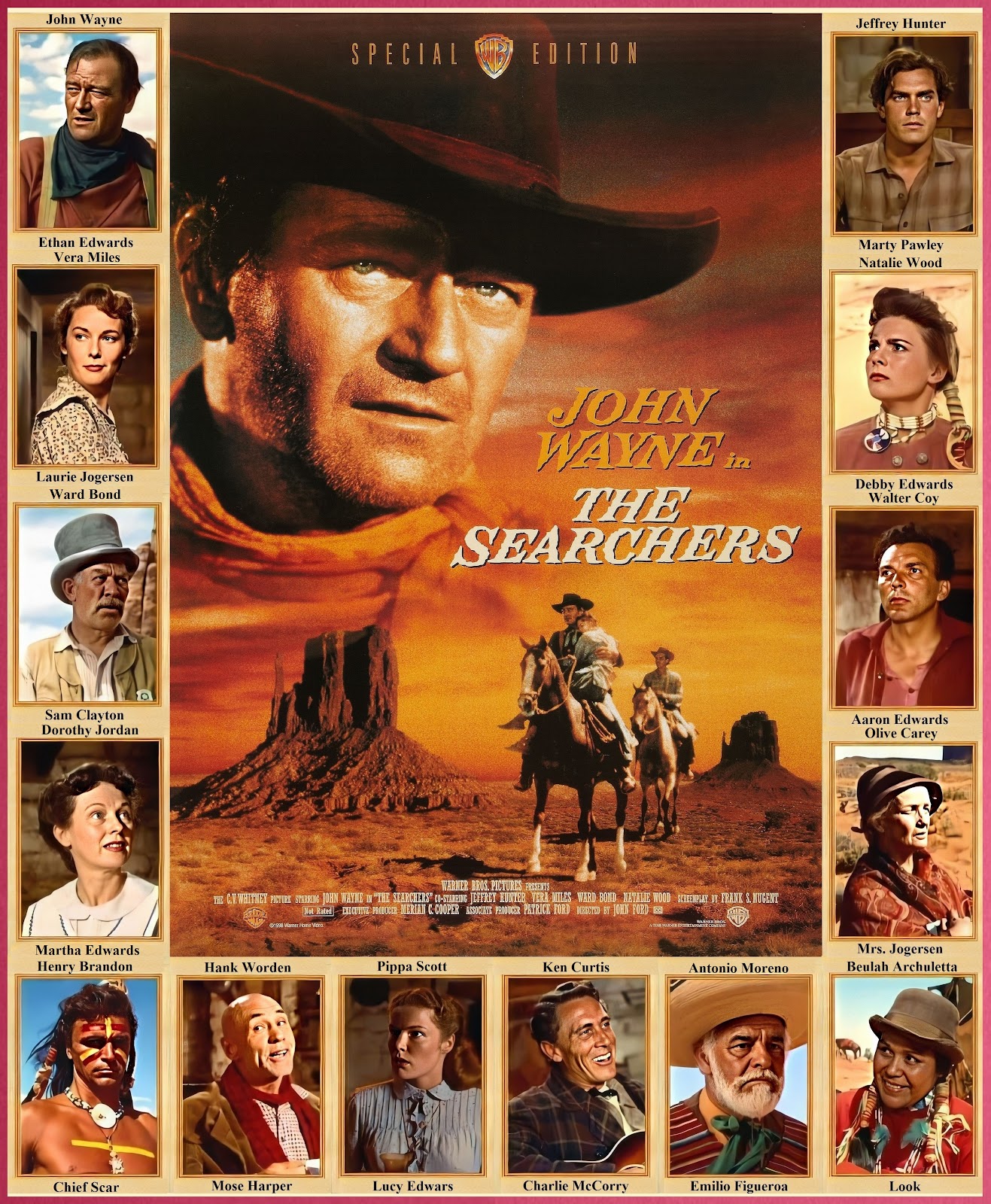


.png)

















